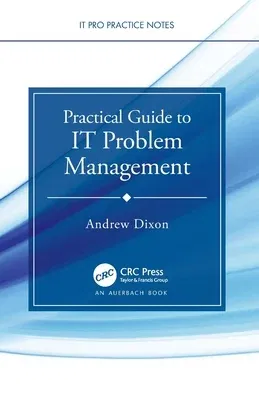Some IT organisations seem to expend all their energy firefighting -
dealing with incidents as they arise and fixing, or patching over, the
breakage. In organisations like this, restarting computers is seen as a
standard method to resolve many issues. Perhaps the best way to identify
whether an organisation understands problem management is to ask what
they do after they have restarted the computer. If restarting the
computer fixes the issue, it is very tempting to say that the incident
is over and the job is done. Problem management recognises that things
do not improve if such an approach is taken. Such organisations are
essentially spending their time running to stay in the same place.
Written to help IT organisations move forward, Practical Guide to IT
Problem Management presents a combination of methodologies including
understanding timelines and failure modes, drill down, 5 whys and divide
and conquer. The book also presents an exploration of complexity theory
and how automation can assist in the desire to shift left both the
complexity of the problem and who can resolve it. The book emphasises
that establishing the root cause of a problem is not the end of the
process as the resolution options need to be evaluated and then
prioritised alongside other improvements. It also explores the role of
problem boards and checklists as well as the relationship between
problem management and Lean thinking. This practical guide provides both
a framework for tackling problems and a toolbox from which to select the
right methodology once the type of problem being faced has been
identified. In addition to reactive methods, it presents proactive
activities designed to reduce the incidence of problems or to reduce
their impact and complexity should they arise.
Solving problems is often a combination of common sense and
methodologies which may either be learnt the hard way or may be taught.
This practical guide shows how to use problem solving tools and to
understand how and when to apply them while upskilling IT staff and
improving IT problem solving processes.

